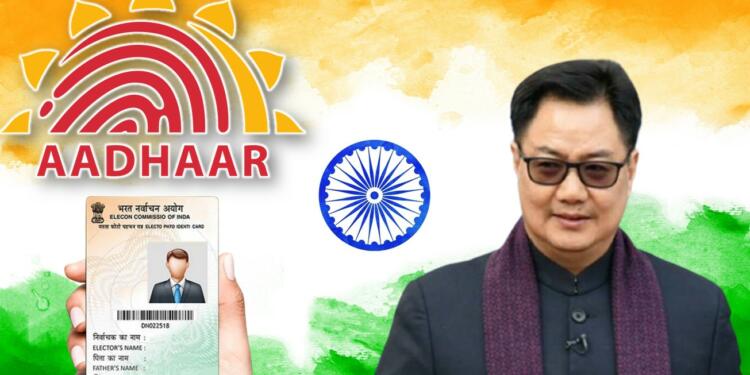After years of pushing back and forth, India is all set to usher in some massive electoral reforms. Law minister Kiren Rijiju is poised to introduce a bill that will change the voting landscape in the country.
PM Modi-led Union Cabinet will introduce a bill proposing electoral reforms in the country. According to reports available in the public domain, the proposed changes will help in easing the voting process for various sections of society which include the poor, husbands of military ladies, and first-time voters.
Seeding of Aadhaar card with voter id
The proposed bill is believed to have given assent to linking of Aadhaar Card with the prevalent voter id in the country. Following Supreme Court’s order in 2015, linking both these documents is currently impossible to mandate for everyone. Still, a large section of aware citizens will be happy to link them.
However, to counter those unwilling to link, the election commission had proposed reforms in Election law that would empower EC to seek Aadhaar numbers from voters. The Government will amend section 23 of the Representation of People (RP) act 1950 to bring in this massive overhaul.
Mechanism of documents forgery in voter id and how Aadhaar will rectify it
Currently, voter id rules of the country are vulnerable to multiple frauds. When you register yourself for a voter id, the authorities ask for multitudes of documents from you.
To verify your address, authorities ask for documents like a copy of your Passport, Gas bill, Water bill, Ration Card, Bank Passbook, and Aadhaar Card. Except for the Aadhaar card, all the above documents by and large do not need biological proof of your existence. Similarly, various other documents required to verify identity can be easily forged.
Read more: 4.82 Crore Bogus Ration Cards cancelled by Modi government
Aadhaar number is rooted in your biological existence. Once a citizen’s Aadhaar card is made with one’s biometric data, it is almost impossible to forge his/her identity. Connecting Aadhaar cards with voter id will only help in eliminating fraud voters like Bangladeshi immigrants and other infiltrators in the country.
Read more: Election Commission’s plan to link Voter IDs with Aadhar will put many politicians out of business
Multiple windows for new voters to enrol themselves
Up until now, if you attain the age of 18, you have to wait for 1st January of next year to enrol as a voter. Suppose your birthday is on 2nd January, then you are set to miss your voting opportunity for any election being held during the year you turned 18.
The new bill will avail young voters of a total of four opportunities to enrol as new voters. According to reports available in the public domain, a voter will be able to enrol him/herself on 1st January, 1st April, 1st July and 1st October every year. The amendment in section14 of the RP Act makes sure that maximum number of young voters will be able to enrol as voters within 3 months of the day they turn 18.
Gender-neutral Electoral laws
The proposed bill is set to make electoral law gender-neutral for service voters. Currently, only wife of a man serving in the army is allowed to be enrolled as service voters. Since women’s participation in the military affairs of the country is increasing at a massive rate; it would be second sexism to exclude their husbands from the service voters’ list.
The new law will allow military spouses (which includes both wives and husbands) to enrol themselves in the above-mentioned list. The government has proposed to amend section 20 of RP Act, 1950 and Section 60 of RP Act, 1951 for this purpose.
Reports indicate that around 40 electoral reforms are pending with the government. These include remote voting for people who are stationed outside their constituencies for a job. Similarly, countering the menace of paid news during elections is also one of the evils which required complete elimination.
Read more: In a massive jolt to 2BHKs and Maddison Boxers, Paid News could be an electoral offence
India’s voting laws have been subject to multitudes of criticism from various experts. Alleged EVM tampering, impartial funding of political parties, the malaise of paid news and complex election rules have resulted in low voter turnouts in the past. The new electoral reforms are promising in nature and look to be a right step at the right time.




























